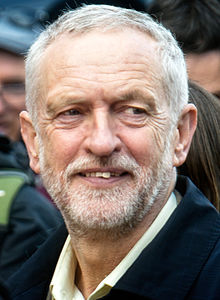I remain an agnostic on whether it would be better for the United Kingdom to be inside or outside the European Union. I find some of the economic arguments for “Remain” Chicken-Little-ish, but who am I to say whether a major decision like that could have dire economic consequences? I am also no expert on British politics, but I do have a sense from afar of what the vote could mean for the Labour Party. And it’s not good.
I have watched interviews with Labour Party leader Jeremy Corbyn and read articles about his position favoring “Remain,” and what strikes me is that in being unwilling to acknowledge that supporters of “Leave” might have a genuine case, he is further distancing the Labour Party from its traditional working class base. In Britain, as in the United States, many of these voters are up in arms about immigration and about runaway shops; and in Britain, contrary to what Corbyn says, the EU is implicated in these issues.
As a member of the EU, Britain has a policy of open borders to immigrants from other EU countries; its companies also can move wherever they want without restriction within the EU. It’s called “freedom of establishment.” British companies have taken advantage of these provisions by employing lower-wage labor from Eastern and Southern Europe for its service industries and by moving factories to Poland and other Eastern European countries where wages are lower. That’s not a chimera, but a real issue, and even if you are for “Remain,” needs to be acknowledged.
Simon Deakin, a Cambridge University professor of law who is actually in favor of “Remain,” writes, “The experience of falling wages and casualisation of work which is being experienced in parts of agriculture (think of farming and food production in Wisbech and Boston) and services (think of Sports Direct’s warehouse in Shirebrook or Amazon’s many distribution centres) is associated with inward migration from other EU member states.” Deakin goes on to list other factors, but he clearly acknowledges that immigration within the EU has put downward pressure on wages.
The Financial Times writes about runaway shops under the EU’s freedom of establishment, “The relocation of factories from wealthier members of the 27-nation European Union to poorer members, mostly in eastern Europe, has long been a sore point for labour unions. But it has become an even greater one amid the economic downturn and the rising unemployment rates that have come with it.”
These are real issues that are driving working class support for “Leave.” Add to these the social costs created by immigration. Corbyn’s response: “Migration actually is a plus to our economy as a whole. Those people pay a lot in taxes, receive much less on average in benefits than the rest of the community and make an amazing contribution.”
Now here’s how the politics parses. Under Tony Blair, Labour had adopted a strategy similar to Bill Clinton in the United States of wooing the white-collar middle and upper-middle class. That kind of strategy can work if you still have the confidence of working class voters and if the opposition is the cranky rightwing. But it will fail absymally if you lose the confidence of working class voters and if the opposition moves to the center. That’s what happened in the last British election where Labour got drubbed.
I had thought Jeremy Corbyn’s mandate was to bring working class voters back into Labour after they deserted in the last election, but I was mistaken. Corbyn has repudiated Tony Blair’s foreign policy, but he has adopted something like his political strategy. The difference is that while Blair’s economic politics reflected high-tech professionals, Corbyn’s seems to reflect the Bohemian, far left segments of the professional classes who spurn any hint of nationalism in their outlook. That’s a recipe for political isolation and desolation. Labour can, of course, make a comeback. One can imagine that if “Leave” wins, there will be a split in the Conservative Party that might open the way for Labour. But if “Remain” wins, the Tories will emerge victorious and Labour will have further alienated the people it needs to win elections.






